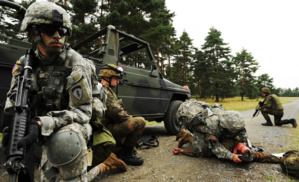In the next 15 years, Berlin is going to increase defense spending by 130 billion euros. This year, Germany has more than 12 billion euros of unallocated budget. Chances are that most will go to solution of the refugee problem, although initially the government planned to vote just a half of the money. Distribution of food, employment and efforts to deportation is not defense, of course. However, the flow of migrants has arisen because of terrorism.
A couple of months ago (before the infamous terrorist attacks in Paris), France planned to "minimize" its army, that is, to lay off thousands of officers and ordinary soldiers. Now, the Elysee Palace quit thinking about the cuts. On the contrary, according to the new plans, the French army will be puffed up by 23 thousand man in the next 4 years. As for Britain, in the near future they are going to spend on strengthening its intelligence and strike aircraft 12 billion pounds. London is also actively discussing new long-term defense spending.
The decision of Jean-Claude Juncker is the turning point that can be called the end of the European savings era in historical works in a couple of years. After the November events in Paris, President of the European Commission allowed France to forget about the hard rules of the EU's budget deficit for an indefinite period. Paris was freed to go beyond the financial limits for the sake of future security.
Pan-European economy as a tool to combat the crisis has been losing popularity for several years. But the events in Greece happened a year ago allowed Germany again remind everyone that it is necessary to tighten belts in difficult times. Greece was even threatened with exclusion from the euro zone for non-compliance with the plan of reducing costs. To recent times, the period from 2007 was very unpleasant for the European Ministries of Defence. The cost of the army in Western Europe fell by more than 13%. Now, all the European leaders, including the Germans, called security a top priority, and with a single heart admit it’s impossible to save on arms anymore.
Experts have called the new defense spending in Europe indirect economic incentives. It should have a positive impact on the European business. One of the best examples - Airbus. In 2013, the company announced a possible reduction of 5800 employees in the military and space division. Now Airbus is reviewing these plans, as demand for its defense products by government customers is growing.
source: wsj.com
A couple of months ago (before the infamous terrorist attacks in Paris), France planned to "minimize" its army, that is, to lay off thousands of officers and ordinary soldiers. Now, the Elysee Palace quit thinking about the cuts. On the contrary, according to the new plans, the French army will be puffed up by 23 thousand man in the next 4 years. As for Britain, in the near future they are going to spend on strengthening its intelligence and strike aircraft 12 billion pounds. London is also actively discussing new long-term defense spending.
The decision of Jean-Claude Juncker is the turning point that can be called the end of the European savings era in historical works in a couple of years. After the November events in Paris, President of the European Commission allowed France to forget about the hard rules of the EU's budget deficit for an indefinite period. Paris was freed to go beyond the financial limits for the sake of future security.
Pan-European economy as a tool to combat the crisis has been losing popularity for several years. But the events in Greece happened a year ago allowed Germany again remind everyone that it is necessary to tighten belts in difficult times. Greece was even threatened with exclusion from the euro zone for non-compliance with the plan of reducing costs. To recent times, the period from 2007 was very unpleasant for the European Ministries of Defence. The cost of the army in Western Europe fell by more than 13%. Now, all the European leaders, including the Germans, called security a top priority, and with a single heart admit it’s impossible to save on arms anymore.
Experts have called the new defense spending in Europe indirect economic incentives. It should have a positive impact on the European business. One of the best examples - Airbus. In 2013, the company announced a possible reduction of 5800 employees in the military and space division. Now Airbus is reviewing these plans, as demand for its defense products by government customers is growing.
source: wsj.com






